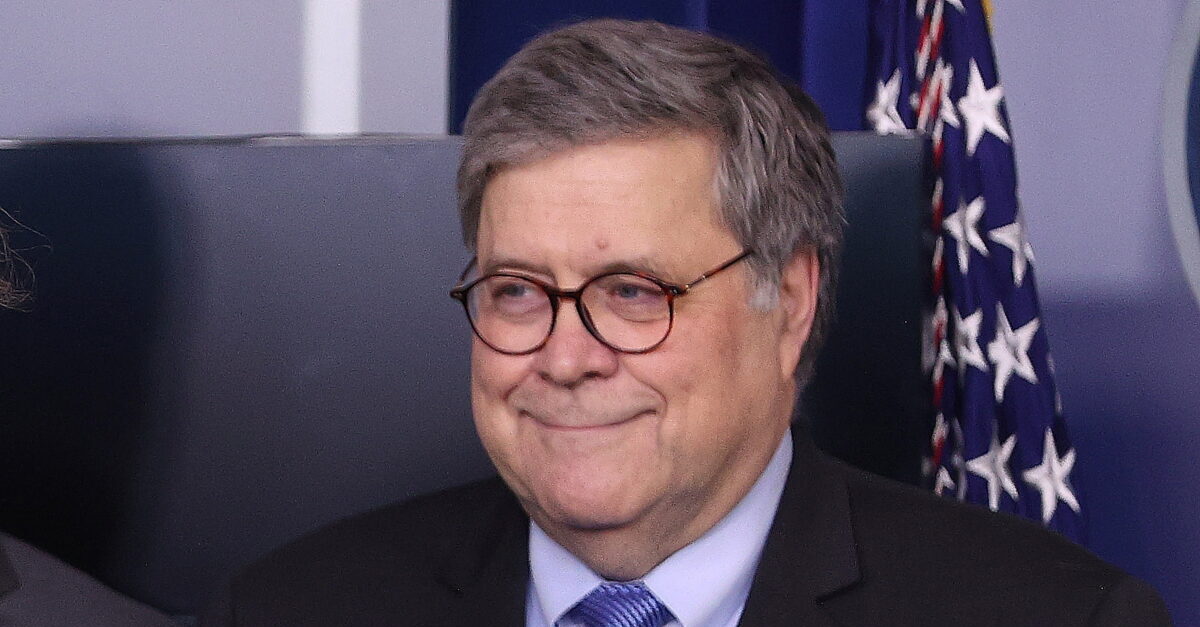
In a move that has long been threatened and long anticipated, the U.S. Department of Justice on Friday filed a “statement of interest” in a lawsuit against coronavirus-related executive orders issued by Illinois Gov. J. B. Pritzker, a Democrat. The plaintiff in the lawsuit against the governor is Darren Bailey, a Republican who serves a rural southeastern Illinois district in the state’s House of Representatives.
The U.S. DOJ’s decision to join Bailey’s fight — coincidentally — came only two days after Bailey was thrown out of his own legislative chamber for failing to wear a mask. The bipartisan vote to temporarily eject him was 81-27, the Washington Post reported. “You’re silencing millions of voices of people who have had enough,” Bailey said of the Thursday vote. Bailey’s district contains closer to 107,000 people.
The crux of the case has nothing to do with that little tidbit, however. According to the DOJ’s news release and several court documents obtained by Law&Crime, Bailey says his governor’s several coronavirus orders are illegal because they, when taken together, have lasted longer than thirty days. Bailey argues that the governor can only exercise emergency powers for 30 days under the Illinois Emergency Management Agency Act.
In essence, Bailey seems to suggest that the governor cannot reissue new executive orders as time goes on to deal with continuing, changing events — it’s one and done in his apparent view. Bailey’s statements on the matter also indicate he wants the state health department’s pandemic response plan to rule the state’s response to the virus, not the governor’s executive order. The health department’s pandemic response plan would, Bailey says, empower local governments.
Bailey filed the original case in Illinois state courts, but the governor removed it to federal court. Bailey has previously accused the governor of forum-shopping within the state’s own courts.
The Department of Justice (DOJ) is reviewing the orders of local governments “to ensure that civil liberties are protected during the COVID-19 pandemic,” a press release said. Eric Dreiband, of the DOJ’s Civil Rights Division, and Matthew Schneider, the U.S. Attorney for the Eastern District of Michigan, are spearheading the reviews.
Buried at the bottom of the DOJ’s news release announcing its self-injection into the claim was the suggestion that states should bend to the whims and wills of federal policy — and, of course, federal law.
“Even in the face of a pandemic, states must comply with their own laws in making these sensitive policy choices in a manner responsive to the people and, in doing so, both respect and serve the goals of our broader federal structure, including the guarantee of due process in the U.S. Constitution,” the DOJ’s news release said.
“The Governor of Illinois owes it to the people of Illinois to allow his state’s courts to adjudicate the question of whether Illinois law authorizes orders he issued to respond to COVID-19,” said Dreiband in the statement. “The United States Constitution and state constitutions established a system of divided and limited governmental power, and they did so to secure the blessings of liberty to all people in our country. Under our system, all public officials, including governors, must comply with the law, especially during times of crisis.”
“However well-intentioned they may be, the executive orders appear to reach far beyond the scope of the 30-day emergency authority granted to the Governor under Illinois law,” said Steven D. Weinhoeft, the U.S. Attorney for the Southern District of Illinois. He was slightly more cautious, however. “[W]hile the people of Illinois must be physically protected from the effects of this public health crisis, including by complying with CDC guidelines[,] their constitutionally guaranteed rights and liberties must be safeguarded as well.”
The DOJ’s statement of interest says the case belongs in state court. “[T]he complaint does not raise any federal constitutional claims,” the DOJ said.
At least one observer said that made it somewhat of a nothingburger:
This next development is certain to be misunderstood:
DOJ has filed a statement of interest in a case challenging the emergency orders issued by the governor of Illinois. Sounds big, but it turns out the statement raises no constitutional issues. … 1/2 https://t.co/DLLOoPlTzf
— Bobby Chesney (@BobbyChesney) May 22, 2020
… It argues, instead, that the case belongs in state rather than federal court (adding, gratuitously, that there may indeed be a problem with the order under Illinois law, involving a time limit on such orders). Details here:https://t.co/PhPUAluD3O. 2/2
— Bobby Chesney (@BobbyChesney) May 22, 2020
Statement of Interest filed today sets out DOJ’s views on Due Process (& Equal Protection, under Lee Optical) as limit on state public health orders. They make the correct point that even post-Lochner, courts can police for arbitrariness. Rational basis review would apply there. https://t.co/nUdIns3FJK
— Bobby Chesney (@BobbyChesney) May 22, 2020
Read the DOJ’s filing and several of the governor’s earlier arguments in the readers below:
STATEMENT OF INTEREST ON BE… by Law&Crime on Scribd
NOTICE OF REMOVAL by Law&Crime on Scribd
GOVERNOR’S MEMORANDUM IN OP… by Law&Crime on Scribd
[Image via Win McNamee/Getty Images.]